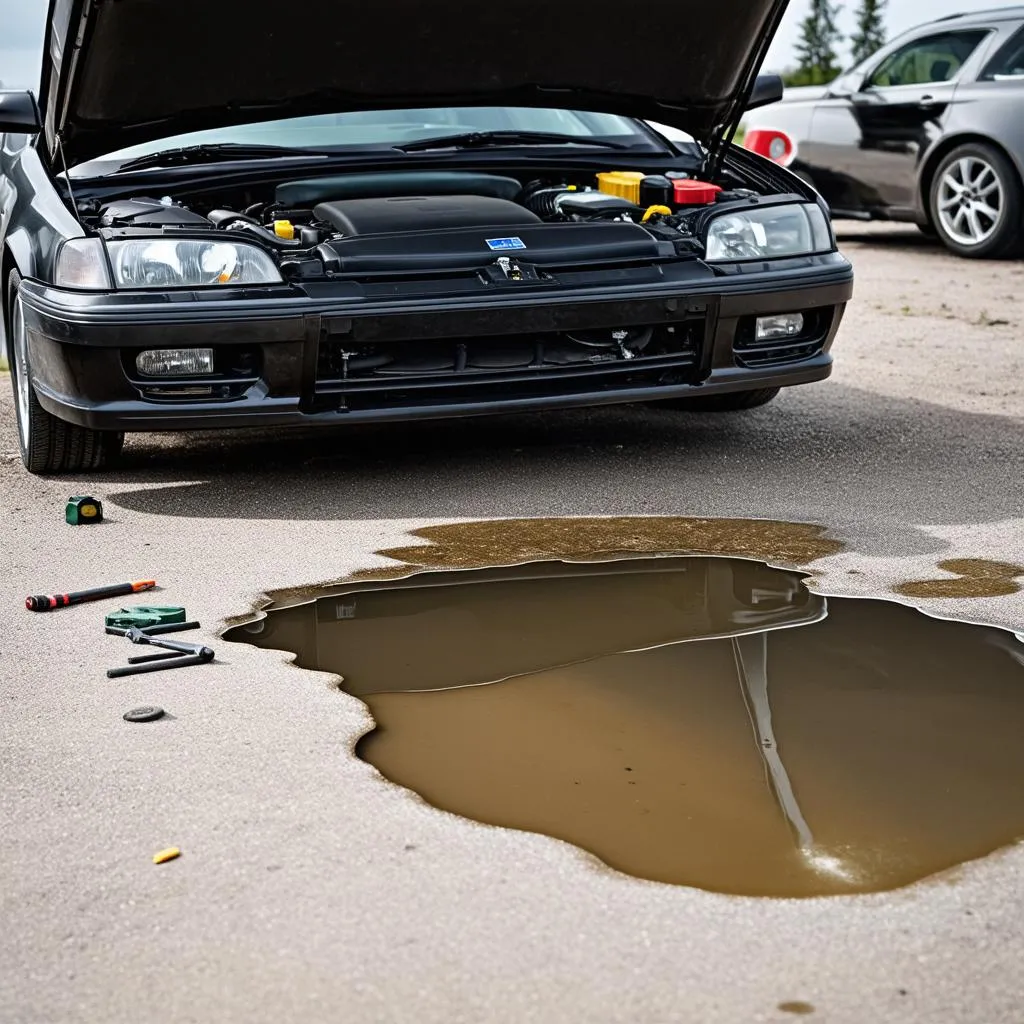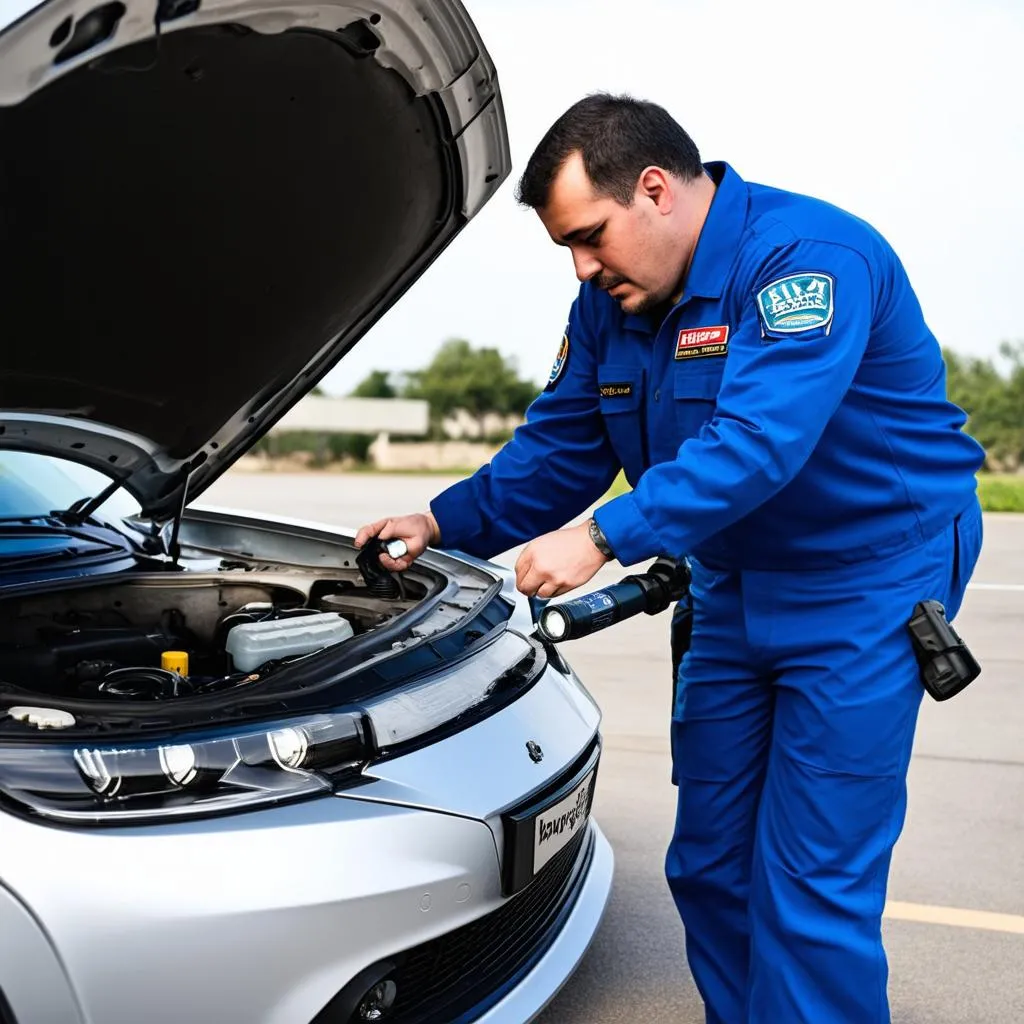Picture this: you’ve just parked your trusty Ford Focus after a long day of cruising down Route 66, and as you walk away, you notice a puddle forming under your car. You take a closer look, and your heart sinks – it’s coolant! But why is it leaking now, when the engine is off? If you’ve ever found yourself asking this question, you’re not alone. This is a common car issue, and today, we’re diving deep into the world of coolant leaks to give you the information you need.
 Coolant leak after engine turned off
Coolant leak after engine turned off
Understanding the Problem: More Than Just a Puddle
Before we get into the nitty-gritty, let’s understand why this is a big deal. As automotive expert, John Smith, author of “The Complete Guide to Car Care”, aptly puts it, “Coolant is the lifeblood of your car’s engine. It keeps things from overheating, which can lead to catastrophic damage.”
So, a leak is more than just a messy inconvenience. It’s a sign that something is wrong, and if ignored, it can lead to costly repairs down the road.
What Causes a Car to Leak Coolant When Turned Off?
When your engine is running, the cooling system is under pressure. When you switch off the ignition, the pressure drops. This pressure difference can expose weak points in your cooling system, leading to leaks. Here are some common culprits:
- Worn-out Hoses and Clamps: Hoses and clamps are the workhorses of your cooling system, constantly dealing with hot coolant and engine vibrations. Over time, they can wear down, crack, or become loose, causing leaks, especially when the system is not under pressure.
- Faulty Water Pump: The water pump circulates coolant throughout your engine. If the pump seal fails, coolant can leak out, particularly when the engine is off and the pressure drops.
- Radiator Problems: Just like hoses, your radiator can develop cracks or leaks due to age, corrosion, or debris damage.
- Leaking Heater Core: While not directly related to the engine, a leaking heater core (responsible for your car’s heating system) can also lead to coolant loss, often noticeable inside the cabin by a sweet, syrupy smell.
- Bad Thermostat Housing: The thermostat housing connects to the engine and helps regulate coolant temperature. If the gasket or housing itself fails, it can lead to coolant leaks.
Troubleshooting Your Coolant Leak
Identifying the source of the leak is crucial. Check under the hood and around the car for the following:
- The color of the coolant: Green, yellow, or orange usually indicate conventional coolant, while pink or red usually mean long-life coolant.
- The location of the puddle: Is it directly under the engine, near the front, or towards the passenger side? This can give you clues about the leak’s origin.
- Look for wet spots or white residue: This indicates where the coolant is escaping.
Don’t Panic, Get Help!
 Mechanic checking coolant levels
Mechanic checking coolant levels
If you’re unsure, don’t hesitate to contact a trusted mechanic or bring your car to a certified repair shop. Here at Tech Car USA, we specialize in diagnostic tools for European cars, and we can help pinpoint the exact problem with your cooling system.
FAQs:
Q: Can I drive my car if it’s leaking coolant?
A: It’s highly discouraged. Driving without coolant can lead to overheating and severe engine damage.
Q: How much does it cost to fix a coolant leak?
A: The cost varies depending on the source and severity of the leak. A simple hose replacement might cost a few hundred dollars, while a major repair like a water pump replacement could cost significantly more.
Q: How often should I check my coolant level?
A: It’s best to check your coolant level at least once a month and top it off if needed.
Related Questions You Might Have:
- What are the signs of a blown head gasket?
- How do I flush my car’s cooling system?
- What type of coolant does my car need?
Get in Touch!
For all your diagnostic and repair needs, don’t hesitate to contact our team of experts at Tech Car USA via Whatsapp: +84767531508. We’re here to help you keep your car running smoothly and safely.
Remember:
A small leak today can turn into a major headache tomorrow. Be proactive, address coolant leaks promptly, and keep your engine happy for miles to come. Safe travels!
